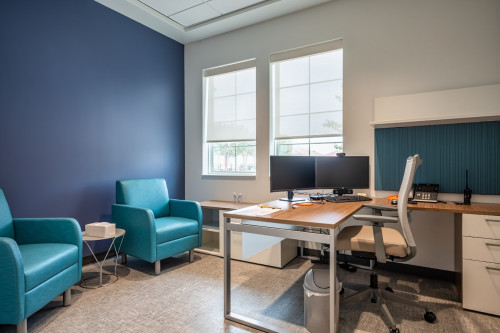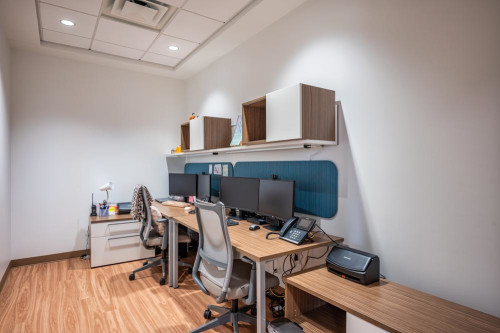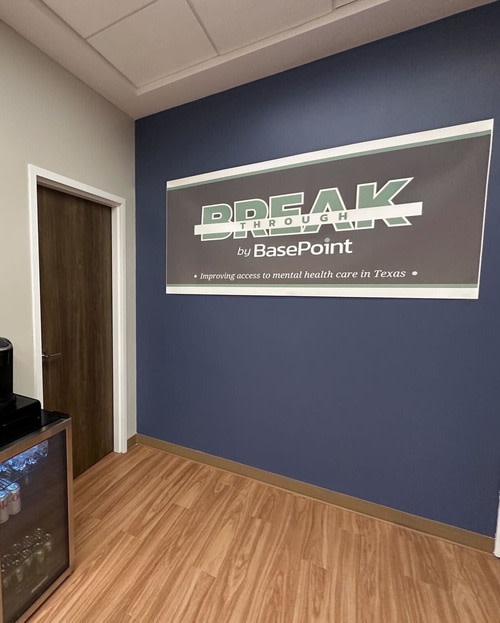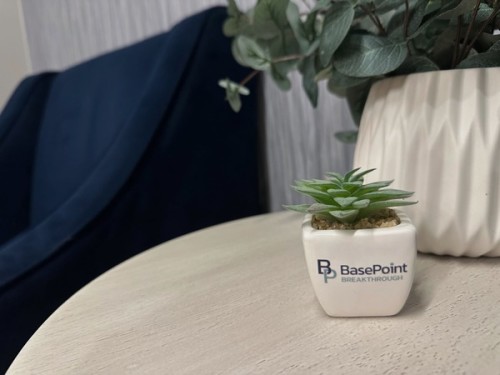






BasePoint BreakThrough McKinney (Virtual)
Verified Center
This provider's information has been quality-checked by Recovery.com's Research Team for accuracy and completeness, including center verification through appropriate third-party organizations.
Treatment Focus
This center treats mental health conditions and co-occurring substance use. You receive collaborative, individualized treatment that addresses both issues for whole-person healing.
Primary Level of Care
The delivery of therapeutic services utilizing technology such as video conferencing, online messaging or phone calls, allowing for flexibility, comfort and increased access to care
Treatment Focus
This center treats mental health conditions and co-occurring substance use. You receive collaborative, individualized treatment that addresses both issues for whole-person healing.
Primary Level of Care
The delivery of therapeutic services utilizing technology such as video conferencing, online messaging or phone calls, allowing for flexibility, comfort and increased access to care
Provider's Policy
Contact the center to speak with a licensed therapist for a same day mental health assessment. BasePoint accepts insurance for Virtual Treatment and accepts most major private insurance companies. The center does not accept Medicaid, Medicare, or state insurance.
BasePoint BreakThrough McKinney (Virtual)
BasePoint BreakThrough McKinney (Virtual)
About BasePoint BreakThrough McKinney (Virtual)
Contact the center to schedule a free same day mental health assessment with a licensed clinician.
A mental health journey does not have to be a solo battle. BasePoint BreakThrough McKinney offers virtual outpatient programs for adults, providing a vital lifeline for their mental health challenges. Their evidence-based model of healing involves working closely with families and loved ones to create real transformation, all through a convenient and accessible online platform. Operating from 7am to 7pm, 7 days a week, they provide comprehensive virtual support and access to psychiatric evaluations and medication management. They specialize in supporting people with depression, post-traumatic stress disorder (PTSD), anxiety, and other mental health challenges. BasePoint BreakThrough guides their clients through a deeply personal and individualized recovery experience, leveraging technology to offer flexible and effective virtual care.
Feel Empowered on the Path to Healing
BasePoint BreakThrough McKinney strives to revolutionize mental health care for adults by combining compassionate support with scientific precision. The team understands the chaotic world that adults live in and the challenges posed by high stress, continuous online interactions, and relentless social media pressure. The curriculum used at BasePoint Breakthrough goes beyond traditional therapy, integrating group, family, and individual sessions to equip young adults to handle life’s challenges with resilience. The team of doctors and therapists meet weekly to collaborate on each client’s progress, ensuring that all team members are on the same page and the treatment is providing value.
Address the Needs of Millennials and Gen Z
BasePoint BreakThrough's treatment for adults addresses the challenges faced by Millennials and Generation Z, recognizing their complex developmental stage. Their approach focuses on critical areas like identity formation, career exploration, relationship dynamics, and managing academic and professional stressors. By integrating evidence-based methods like cognitive behavioral therapy (CBT) and dialectical behavior therapy (DBT), they provide targeted interventions that help adults develop essential coping skills, emotional regulation, and mindfulness techniques. BasePoint BreakThrough's commitment to caring for their clients extends beyond the treatment period, with aftercare planning that equips clients with the tools and support network needed for long-term success.

Highlights from the Center
Highlights
These highlights are provided by and paid for by the center.
1-on-1 Counseling
Perfect for Professionals
Trauma-Informed Care
Spanish and English
Center Overview
Treatment Focus
This center treats mental health conditions and co-occurring substance use. You receive collaborative, individualized treatment that addresses both issues for whole-person healing.
Joint Commission Accredited
The Joint Commission accreditation is a voluntary, objective process that evaluates and accredits healthcare organizations (like treatment centers) based on performance standards designed to improve quality and safety for patients. To be accredited means the treatment center has been found to meet the Commission's standards for quality and safety in patient care.

Insurance Accepted
Cash Pay Rates
Estimated Cash Pay Rate
Center pricing can vary based on program and length of stay. Contact the center for more information. Recovery.com strives for price transparency so you can make an informed decision.
Meet Your Care Team

Dr. Kimberly Dobbins, MD
Chief Medical Officer
Over a decade of experience as a double board-certified Child and Adolescent and Adult Psychiatrist.

Dr. Talat Tayyaba, MD
General Psychiatrist
Double board-certified Psychiatrist in General and Adolescent Psychiatry, specializes in treating ADHD, depression, anxiety, mood disorders, disruptive behavior disorders, autism spectrum disorder, and psychotic disorders in both children and adults.

Dr. Joshua Wang, MD
General Psychiatrist
Double board-certified Child & Adolescent Psychiatrist who specializes in treating Anxiety, Bipolar Disorder, and ADHD/ADD




Levels of Care





Your Care Options
Specializations
Anxiety
Anxiety is a common mental health condition that can include excessive worry, panic attacks, physical tension, and increased blood pressure.
Co-Occurring Disorders
A person with multiple mental health diagnoses, such as addiction and depression, has co-occurring disorders also called dual diagnosis.
Depression
Symptoms of depression may include fatigue, a sense of numbness, and loss of interest in activities. This condition can range from mild to severe.
Obsessive Compulsive Disorder (OCD)
OCD is characterized by intrusive and distressing thoughts that drive repetitive behaviors. This pattern disrupts daily life and relationships.
Outpatient
During outpatient rehab, patients attend a structured treatment program while continuing to live at home.
Post Traumatic Stress Disorder
PTSD is a long-term mental health issue caused by a disturbing event or events. Symptoms include anxiety, dissociation, flashbacks, and intrusive thoughts.
Trauma
Some traumatic events are so disturbing that they cause long-term mental health problems. Those ongoing issues can also be referred to as "trauma."
Who We Treat
Adolescents
Teens receive the treatment they need for mental health disorders and addiction, with the added support of educational and vocational services.
Young Adults
Emerging adults ages 18-25 receive treatment catered to the unique challenges of early adulthood, like college, risky behaviors, and vocational struggles.
Men and Women
Men and women attend treatment for addiction in a co-ed setting, going to therapy groups together to share experiences, struggles, and successes.
Professionals
Busy, high-ranking professionals get the personalized treatment they need with greater accommodations for work, privacy, and outside communication.
Approaches
Evidence-Based
A combination of scientifically rooted therapies and treatments make up evidence-based care, defined by their measured and proven results.
Family Involvement
Providers involve family in the treatment of their loved one through family therapy, visits, or both–because addiction is a family disease.
Individual Treatment
Individual care meets the needs of each patient, using personalized treatment to provide them the most relevant care and greatest chance of success.
Medical
Medical addiction treatment uses approved medications to manage withdrawals and cravings, and to treat contributing mental health conditions.
Therapies
1-on-1 Counseling
Patient and therapist meet 1-on-1 to work through difficult emotions and behavioral challenges in a personal, private setting.
Online Therapy
Patients can connect with a therapist via videochat, messaging, email, or phone. Remote therapy makes treatment more accessible.
Family Therapy
Family therapy addresses group dynamics within a family system, with a focus on improving communication and interrupting unhealthy relationship patterns.
Psychoeducation
This method combines treatment with education, teaching patients about different paths toward recovery. This empowers them to make more effective decisions.
Relapse Prevention Counseling
Relapse prevention counselors teach patients to recognize the signs of relapse and reduce their risk.
Conditions We Treat
Schizophrenia
Schizophrenia is a serious mental health condition that causes hallucinations, delusions, and disordered thinking.
Grief and Loss
Grief is a natural reaction to loss, but severe grief can interfere with your ability to function. You can get treatment for this condition.
Personality Disorders
Personality disorders destabilize the way a person thinks, feels, and behaves. If untreated, they can undermine relationships and lead to severe distress.
ADHD, ADD
ADHD is a common mental health condition caused by dopamine imbalance. Common symptoms include inattention, hyperactivitiy, and impulsivity.
Anger
Although anger itself isn't a disorder, it can get out of hand. If this feeling interferes with your relationships and daily functioning, treatment can help.
Anxiety
Anxiety is a common mental health condition that can include excessive worry, panic attacks, physical tension, and increased blood pressure.
Bipolar
This mental health condition is characterized by extreme mood swings between depression, mania, and remission.
Burnout
Burnout entails mental and physical exhaustion, and leads to a severe lack of fulfillment. This condition is often caused by overwork.
Depression
Symptoms of depression may include fatigue, a sense of numbness, and loss of interest in activities. This condition can range from mild to severe.
Substances We Treat
Alcohol
Using alcohol as a coping mechanism, or drinking excessively throughout the week, signals an alcohol use disorder.
Co-Occurring Disorders
A person with multiple mental health diagnoses, such as addiction and depression, has co-occurring disorders also called dual diagnosis.
Drug Addiction
Drug addiction is the excessive and repetitive use of substances, despite harmful consequences to a person's life, health, and relationships.
Languages
Aftercare
Care Designed for Your Needs
Special Considerations
Young Adults Program
Programs for young adults bring teens 18+ together to discuss age-specific challenges, vocational and educational progress, and successes in treatment.






